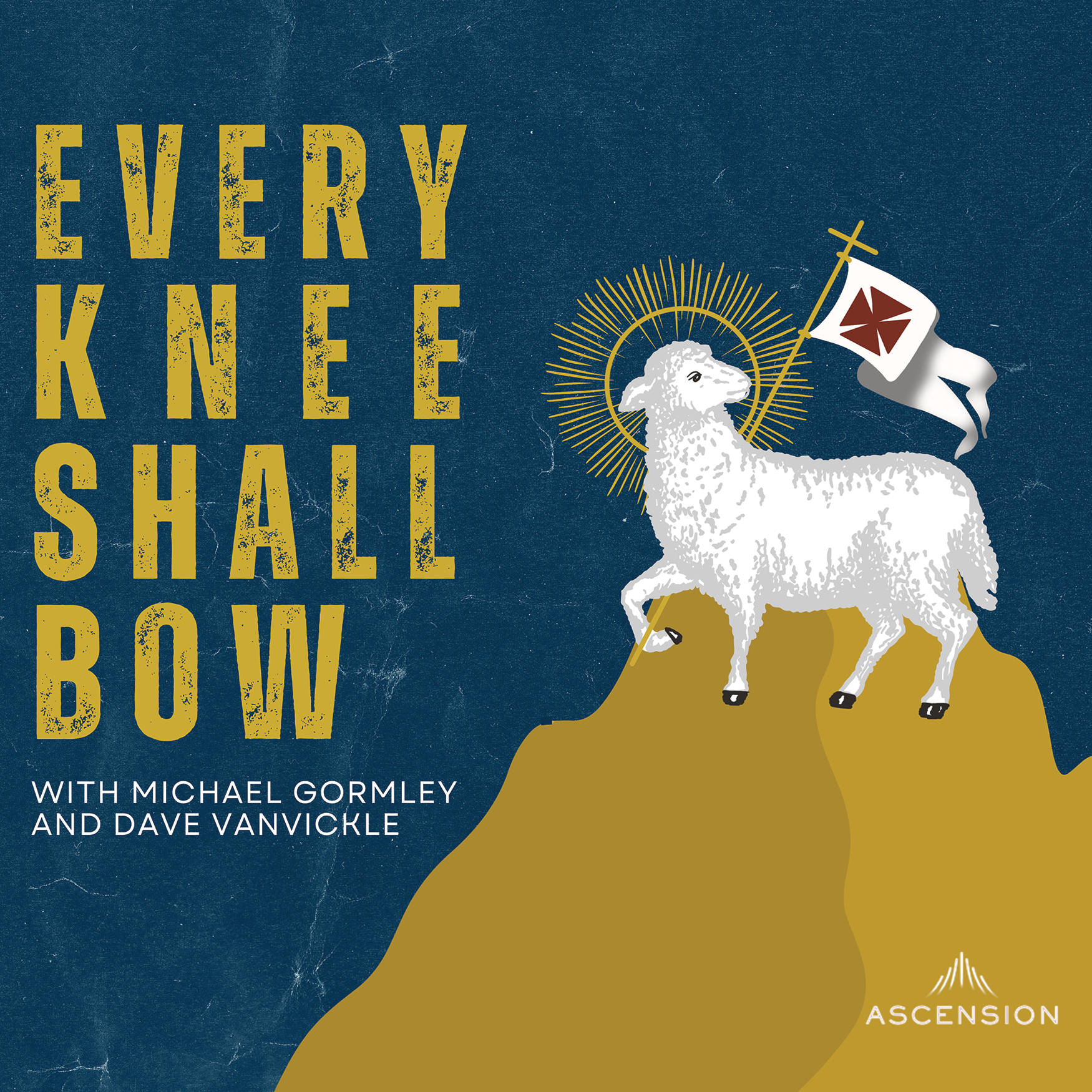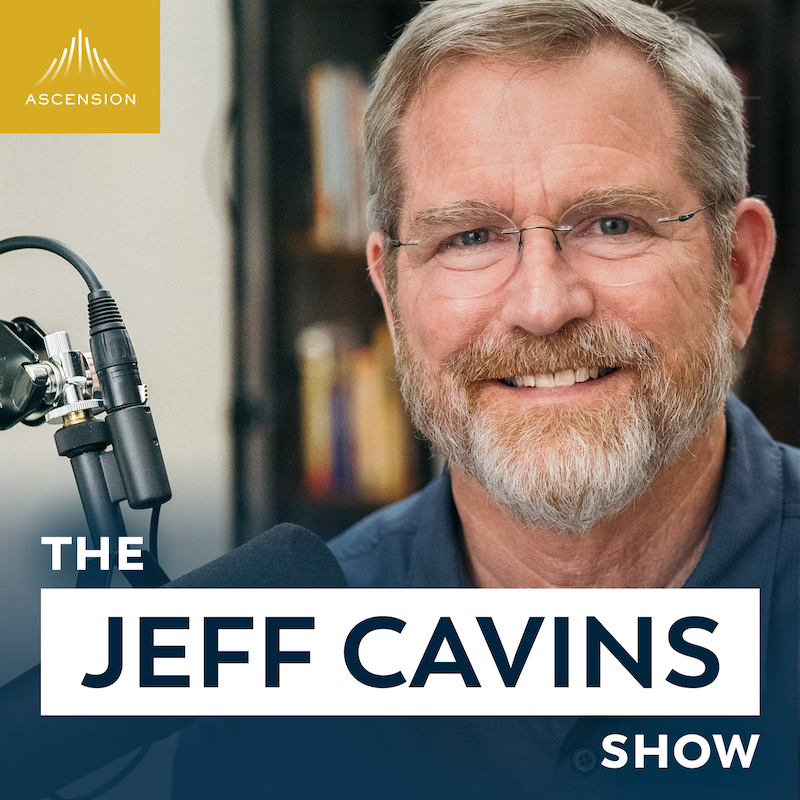It’s good to have faith, but you need to have the work to back it up. Today, Jeff explains why it’s so important to pair our faith with works, giving several examples from the Bible and the Catechism.
Snippet of the Show
“Entrust yourself to him.”
Shownotes
Man’s Response To God, Faith
“By his Revelation, ‘the invisible God, from the fullness of his love, addresses men as his friends, and moves among them, in order to invite and receive them into his own company.’ The adequate response to this invitation is faith. By faith, man completely submits his intellect and his will to God. With his whole being man gives his assent to God the revealer. Sacred Scripture calls this human response to God, the author of revelation, ‘the obedience of faith’.” – CCC 142-143
“The Letter to the Hebrews, in its great eulogy of the faith of Israel’s ancestors, lays special emphasis on Abraham’s faith: ‘By faith, Abraham obeyed when he was called to go out to a place which he was to receive as an inheritance; and he went out, not knowing where he was to go.’ By faith, he lived as a stranger and pilgrim in the promised land. By faith, Sarah was given to conceive the son of the promise. And by faith Abraham offered his only son in sacrifice.” – CCC 145
“The Virgin Mary most perfectly embodies the obedience of faith. By faith Mary welcomes the tidings and promise brought by the angel Gabriel, believing that ‘with God nothing will be impossible’ and so giving her assent: ‘Behold I am the handmaid of the Lord; let it be [done] to me according to your word.’ Elizabeth greeted her: ‘Blessed is she who believed that there would be a fulfillment of what was spoken to her from the Lord.’ It is for this faith that all generations have called Mary blessed.” – CCC 148-149
Two Aspects to Faith and Believing
“Faith is first of all a personal adherence of man to God. At the same time, and inseparably, it is a free assent to the whole truth that God has revealed. As personal adherence to God and assent to his truth, Christian faith differs from our faith in any human person. It is right and just to entrust oneself wholly to God and to believe absolutely what he says. It would be futile and false to place such faith in a creature.” – CCC 150
The key to understanding the Creed is the word “believe.”
According to the Catechism, believing has two aspects:
- Mental Assent: My mind makes some intellectual acknowledgment to all that God has revealed in the Scriptures and through his Church.
- Personal Entrusting: One of the words that is translated “belief” is the Hebrew word “Amen”. Pope Benedict comments on this word as meaning, “to take my stand on someone else.”
What is the Response To the Divine Revelation?
“To obey (from the Latin ob-audire, to ‘hear or listen to’) in faith is to submit freely to the word that has been heard, because its truth is guaranteed by God, who is Truth itself. Abraham is the model of such obedience offered us by Sacred Scripture. The Virgin Mary is its most perfect embodiment.” – CCC 144
“And Abram said, ‘Behold, thou hast given me no offspring; and a slave born in my house will be my heir.’ And behold, the word of the Lord came to him, ‘This man shall not be your heir; your own son shall be your heir.’ And he brought him outside and said, ‘Look toward heaven, and number the stars, if you are able to number them.’ Then he said to him, ‘So shall your descendants be.’ And he believed the Lord; and he reckoned it to him as righteousness.” – Genesis 15:3-6
“And Mary said, ‘Behold, I am the handmaid of the Lord; let it be to me according to your word.’ And the angel departed from her.” – Luke 1:38
In salvation history, God revealed himself to his people, but He always called for a response:
- Noah could not continue life as usual and build an ark at the same time (Genesis 6)
- Abraham couldn’t father a nation in Ur, he had to move (Genesis 12)
- Moses could not stay on the backside of the desert and still lead his people (Exodus 3)
- David had to leave his sheep to become king of Israel (1 Samuel 16)
- Amos had to leave his sycamore tree to deliver God’s message (Amos 7)
- Jonah had to overcome a prejudice toward the Assyrians.
- There was no oil until the vessels were gathered (2 Kings 4:3-4)
- There was no healing for the leper until he had dipped seven times (2 Kings 5:10)
- No harvest until the fallow ground was plowed or prepared (Hosea 10:12)
- No reconciliation without repentance (Joel 2:12,13)
- The feeding of the 5000 (John 6, Mark 6)
- Peter getting out of the boat (Matt 14:22-33)
Words are not enough. We must do something.
“Jesus’ invitation to enter his kingdom comes in the form of parables, a characteristic feature of his teaching. Through his parables he invites people to the feast of the kingdom, but he also asks for a radical choice: to gain the kingdom, one must give everything. Words are not enough, deeds are required. The parables are like mirrors for man: will he be hard soil or good earth for the word? What use has he made of the talents he has received? Jesus and the presence of the kingdom in this world are secretly at the heart of the parables. One must enter the kingdom, that is, become a disciple of Christ, in order to ‘know the secrets of the kingdom of heaven’. For those who stay ‘outside’, everything remains enigmatic.” – CCC 546
“But some one will say, ‘You have faith and I have works.’ Show me your faith apart from your works, and I by my works will show you my faith. You believe that God is one; you do well. Even the demons believe—and shudder. Do you want to be shown, you foolish fellow, that faith apart from works is barren? Was not Abraham our father justified by works, when he offered his son Isaac upon the altar? You see that faith was active along with his works, and faith was completed by works, and the scripture was fulfilled which says, ‘Abraham believed God, and it was reckoned to him as righteousness’; and he was called the friend of God. You see that a man is justified by works and not by faith alone… For as the body apart from the spirit is dead, so faith apart from works is dead.” – James 2:18-24,26
Resources
- Email us at thejeffcavinsshow@ascensionpress.com
- Text “jeffcavins” to 33-777 to subscribe and get added to Jeff’s shownotes email list
- Visit Jeff’s website at www.jeffcavins.com
- The Great Adventure Bible
- Listen to the Bible in a Year (with Fr. Mike Schmitz)
- Pilgrimages with Jeff
- Fulfilled: Uncovering the Biblical Foundations of Catholicism by Sonja Corbitt
- Ascension is pleased to offer our new and improved online bible study programs and sacramental preparation programs digitally to help you minister with flexibility. Go to ascensionpress.com to view all our offerings!

Meet Your Host: Jeff Cavins
Jeff Cavins is passionate about helping people understand Scripture and become disciples of Jesus Christ. Though he was born Catholic, Jeff went to Bible school and served as a protestant minister for twelve years before reverting to the Catholic Faith. Jeff then received his MA in Theology from Franciscan University of Steubenville. Since then, he has become a leading Catholic evangelist and author.
Jeff created The Bible Timeline learning system, which revolutionized Catholic Bible Study for millions of Catholics. Since its introduction, Jeff has developed The Great Adventure series of Bible studies to help people better understand Sacred Scripture and its meaning for their lives.



